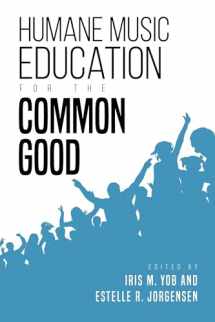
Humane Music Education for the Common Good (Counterpoints: Music and Education)
Book details
Summary
Description
Why teach music? Who deserves a music education? Can making and learning about music contribute to the common good? In Humane Music Education for the Common Good, scholars and educators from around the world offer unique responses to the recent UNESCO report titled Rethinking Education: Toward the Common Good. This report suggests how, through purpose, policy, and pedagogy, education can and must respond to the challenges of our day in ways that respect and nurture all members of the human family. The contributors to this volume use this report as a framework to explore the implications and complexities that it raises. The book begins with analytical reflections on the report and then explores pedagogical case studies and practical models of music education that address social justice, inclusion, individual nurturance, and active involvement in the greater public welfare. The collection concludes by looking to the future, asking what more should be considered, and exploring how these ideals can be even more fully realized. The contributors to this volume boldly expand the boundaries of the UNESCO report to reveal new ways to think about, be invested in, and use music education as a center for social change both today and going forward.


We would LOVE it if you could help us and other readers by reviewing the book
Book review



